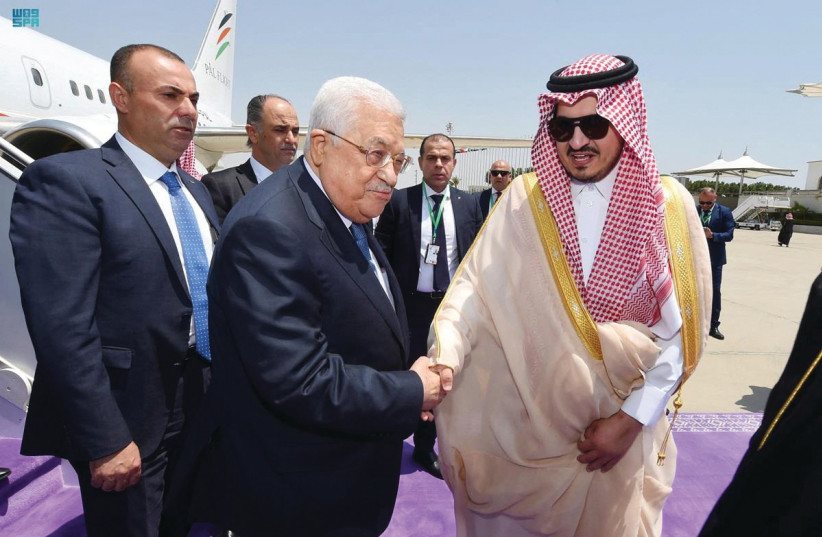Palestinians kept in dark about potential Israeli-Saudi normalization – analysis
The Palestinian Authority is closely following reports concerning a possible normalization agreement between Israel and Saudi Arabia, Palestinian officials said Wednesday.
The PA leadership has yet to receive word from the Saudis regarding the veracity of the reports, the officials said.
Earlier this week, PA Prime Minister Mohammad Shtayyeh hinted that the Palestinian leadership was aware of the US efforts to persuade Saudi Arabia to strike a deal with Israel.
“There is an important diplomatic activity in the region,” he said in opening remarks at the weekly meeting of the PA cabinet in Ramallah.
Shtayyeh seemed to voice concern over the reports that Saudi Arabia might reach a normalization agreement with Israel.
 PALESTINIAN AUTHORITY head Mahmoud Abbas is received by Prince Badr Bin Sultan, as he arrives to attend the Arab League Summit in Jeddah, last month. (credit: SAUDI PRESS AGENCY/REUTERS)
PALESTINIAN AUTHORITY head Mahmoud Abbas is received by Prince Badr Bin Sultan, as he arrives to attend the Arab League Summit in Jeddah, last month. (credit: SAUDI PRESS AGENCY/REUTERS)“We are aware and confident that the Kingdom of Saudi Arabia has placed the Palestinian cause at the focus of its attention and at the top of its priorities during its regional and international deliberations,” he said, adding that the Saudis “support al-Aqsa Mosque, Jerusalem, and Palestine.”
Shtayyeh revealed that PA President Mahmoud Abbas was “highly involved in the diplomatic activity.” He did not elaborate.
PA warns Saudi Arabia not to turn its back on the Palestinians
Shtayyeh’s remarks were seen as a message to Riyadh not to turn its back on the Palestinians if and when it reaches an agreement with Israel.
The Palestinian leadership, which was caught by surprise when normalization agreements were signed between Israel and the United Arab Emirates and Bahrain, rushed to condemn the two Gulf states, accusing them of betraying the Palestinian issue, Jerusalem, and al-Aqsa Mosque.
The Palestinians considered the agreements to be a violation of the 2002 Arab Peace Initiative, which stipulated that the Arab countries would establish normal relations with Israel only after a “complete withdrawal from the Arab territories occupied since 1967, a just resolution to the problem of the Palestinian refugees in conformity with [United Nations] Resolution 194, and [the establishment of] an independent and sovereign Palestinian state… with Jerusalem as its capital.”
The PA leadership is well aware that it is one thing to attack the UAE and Bahrain, but it is another thing to come out in public against Saudi Arabia, the most powerful and influential country in the Arab and Islamic world.
Even though Saudi Arabia does not provide the Palestinians with hundreds of millions of dollars every year, the kingdom’s political support is not less significant for that. Furthermore, the PA leadership cannot afford to lose the political backing of Saudi Arabia, whose policies have always been very supportive of the Palestinians.
At this stage, it is not clear how Abbas is involved in the diplomatic effort to forge a deal between Israel and Saudi Arabia. On Tuesday, he flew to Amman, where he met with Jordan’s King Abdullah, who maintains close relations with the Saudis. According to Palestinian and Jordanian sources, the two discussed “the latest political developments” in the region – an apparent reference to the ongoing US effort to reach a normalization agreement between Israel and Saudi Arabia.
The Palestinians’ biggest concern is that such a deal would embolden the Israeli government, especially at a time when it is facing widespread protests over its judicial overhaul plan. The Palestinians are also worried that a normalization deal would encourage Israel to step up its military operations and other practices in the West Bank and Jerusalem.
Last week, Palestinian Foreign Minister Riyad al-Malki said the Palestinians were aware of the US effort to normalize Saudi relations with Israel. The Palestinians were also aware that the Saudis have set preconditions for reaching such a deal, he told reporters in Ramallah.
“We hope that Saudi Arabia would stick to its position and not yield to the pressure,” Malki said. “We want Saudi Arabia to listen to us and consult with us. Saudi-Palestinian relations are strong, and we have confidence in them.”
US and Saudi officials have agreed to “broad terms” for a normalization agreement that will hopefully be hammered out over the course of the coming year, The Wall Street Journal reported Wednesday. According to unconfirmed reports, the Saudis are demanding, among other things, that Israel make concessions to the Palestinians in return for a normalization agreement. The nature of the proposed concessions has not been disclosed.
Commenting on the reports, two senior Palestinian officials on Wednesday said the PA leadership has no idea what concessions, if any, the Saudis are demanding from Israel in return for a normalization agreement.
“We don’t know what concessions they’re talking about,” said one official. “We don’t believe this Israeli government, which consists of extremist parties, is prepared to make substantial concessions to the Palestinians.”
Another official said the Saudis have not notified Ramallah of any change in their policy toward the Israel-Arab conflict.
“The only information we have is from the media or from third parties,” the official said. “In any case, we hope that [Saudi Crown Prince] Mohammed bin Salman will consult with us before he makes any move. We believe that Saudi Arabia won’t abandon its commitments to the Palestinians.”





Comments are closed.